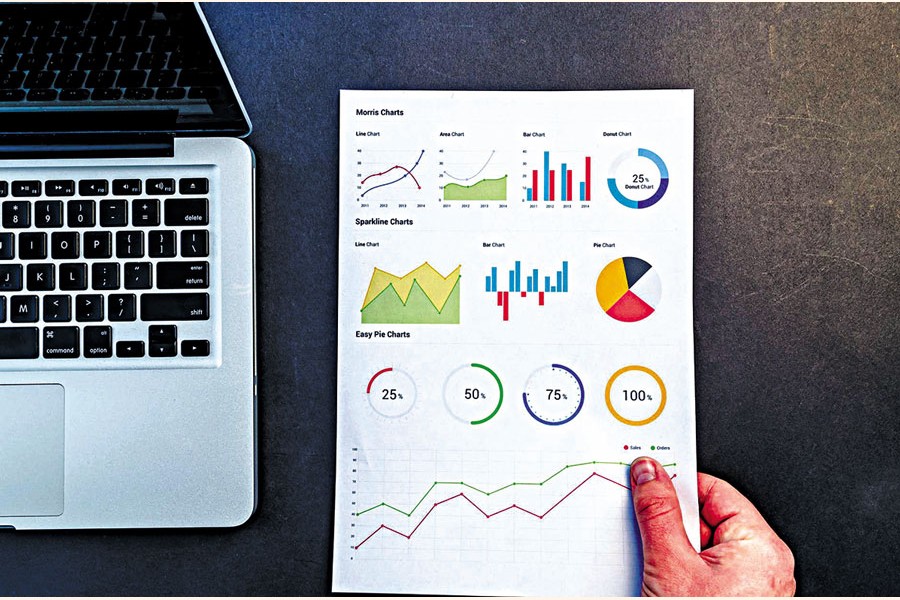Globally, companies across different industries are transitioning towards being data-driven. One may ask: what exactly does being data-driven mean? The answer to this question is that when companies make strategic decisions by analysing data and interpreting them, they are being data-driven.
Most businesses in Bangladesh do not have the culture of storing and analysing data with the purpose of deriving insights from them. However, here are some steps they can take to veer towards being driven by data.
Understanding the benefits of being data-driven: Once a business problem is identified, companies usually take three broad steps: defining the problem clearly, seeking the root causes of the problem, and unearthing optimal solutions. There are scopes of making errors in all of these steps which could impede the company from reaching optimal solutions. However, data-oriented companies have a competitive edge of being more accurate in problem identification and solving.
The Analytics Adviser at Intelligent Machines and guest lecturer at the Institute of Business Administration, University of Dhaka, Khan Muhammad Saqiful Alam says, "Even in industries and organisations where personal experience and hunch plays a major role, data-driven decision making can add value. Data will not replace expertise, but it helps in supporting expertise, as we live in a world where we are producing billions of data points daily."
As such, if data is stored and analysed the right way, it can be used to reach company-specific objectives taking relevant external and internal factors into account. Their current workflow can be tailored to materialise their future goals by incorporating data analytics into their processes.
Assessing data-readiness of organisations: A company's data readiness refers to the infrastructure, human resources, and capacity they have to adopt data-driven means of decision-making. Realising the benefits of using data in choosing the right way forward, several organisations in Bangladesh have equipped themselves with the ability to collect required data, perform basic analysis, and use statistical tests and forecasts.
A restaurant that can forecast its estimated sales volume for some time will be able to order the right amount of raw materials and inventory, thereby reducing cost and wastage.
However, some firms realise the importance of incorporating a data culture but are not certain about how it can be implemented. As such, the company's approach to becoming data-ready should be based upon their needs, goals, and infrastructure.
Formulating data collection strategies: The nature of findings sought by a company determines the mode of data collection. For instance, if a bank desires to gather in-depth insights about their end-user satisfaction levels, they can adopt classical means of data collection such as face-to-face interviews and focus group discussions (FGDs). They can use surveys if they want a broad range of data from a large number of end-users.
Acknowledging the importance of adopting the right strategy, Saqiful Alam says, "The myth here is that if we [the company] hire enough data-savvy professionals and give them access to numbers, then the company is data-driven. In reality, to make the best out of the data, a company needs to map exactly where the data adds value to the core competencies, what is the outcome of making processes data-driven, and then formulate long-term and short-term plans to incorporate data in the business processes."
Setting up a data team: According to the Harvard Business School article titled 'How to Structure Your Data Analytics Team', companies that want a full-fledged data team should involve professionals in three key roles: data scientists, data engineers, and data analysts. Data scientists usually perform advanced analysis using machine learning, statistical modelling, and AI (artificial intelligence) tools. Data engineers, who work closely with both scientists and analysts, are mostly responsible for preparing the ecosystem that the team relies on. Analysts, on the other hand, are tasked with visualising the data, performing analysis, and generating findings.
The article also highlights that companies should determine the size of the team depending on how much data needs to be analysed. Then they should decide on the number of teams needed according to the holistic data strategy of the team. If the nature of the company allows provision for adopting small-scale strategies that are not data-driven, it may be possible to get by with fewer resources and a smaller team.
Narrowing down on what exactly can be done with data: Once the company has set the right goals considering the findings from data, they can predict relevant metrics taking the right variables into account. Retail stores can predict how much a group of customers will spend by factoring in their demographic, geographic, and lifestyle variables in a given period. Customers can also be grouped into clusters using machine learning based on their commonalities. Data science tools can help us narrow down further and determine the extent of correlation between, for example, consumers' annual income and their purchasing habits. Gaining knowledge about this can help retail stores offer customised services as per consumer demands and produce targeted advertisements for each consumer cluster.
Many businesses acknowledge these benefits and still hesitate to adopt data-driven means of decision-making. Saqiful Alam summarises why that is the case with businesses in Bangladesh, "Managements of companies often overestimate the complexities associated with the data-driven approach. To make the best use of data, management teams and decision-makers need to be aware of the ways these tools and techniques can be used in the organisation."
The writer is a final-year BBA student at IBA (DU).
[email protected]


